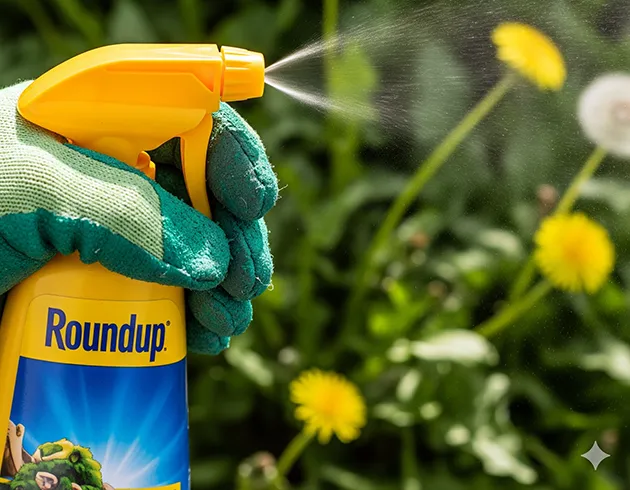RoundUp Cancer Lawsuits Are Being Filed Now

Photo Credit: Unsplash | Published: September 14, 2025
Status: Open to Claims
Payout Award: Varies
You may qualify for compensation
If you or a loved one used or were exposed to RoundUp and later received a diagnosis of Non-Hodgkin's lymphoma or a related lymphoma, you may qualify for a lawsuit seeking compensation for medical expenses, lost wages, and other losses.Who qualifies
Eligibility generally focuses on exposure to glyphosate and a qualifying cancer diagnosis. Examples that attorneys may review include• Non-Hodgkin's Lymphoma (NHL)
• Diffuse large B-cell lymphoma (DLBCL)
• Follicular lymphoma
• Mantle cell lymphoma
• Burkitt lymphoma
• Chronic lymphocytic leukemia (CLL)
• Peripheral T-cell lymphomas and other subtypes
Residential and occupational users such as farmers, groundskeepers, landscapers, and home gardeners are often evaluated. A pre-qualification form can help confirm eligibility under your state's rules.
How the process works
A typical RoundUp claim involves:• Reviewing information such as any relevant exposure history.
• Gathering documents that support exposure and losses such as medical records, employment or purchase records, and witness statements.
• Filing an individual claim or join coordinated litigation where appropriate. Many cases resolve by settlement. Some proceed to trial and appeal.
Free Case Review
What proof helps
Strong documentation can speed review:• Records confirming effect of exposure
• Evidence of RoundUp use or exposure such as receipts, photos, timecards, work orders, or equipment logs
• Employer or coworker statements and site records
• Notes on when and how RoundUp was used and any protective gear
RoundUp Weed Killer, Glyphosate, and Cancer Risk
RoundUp, one of the most widely used herbicides in the world, contains the active ingredient glyphosate. For decades, it has been applied in farming, landscaping, and even home gardening to control weeds. However, thousands of lawsuits claim that long-term exposure to glyphosate-based herbicides increases the risk of developing Non-Hodgkin's lymphoma and other cancers.Scientific reviews have been mixed. The International Agency for Research on Cancer (IARC) classified glyphosate as “probably carcinogenic to humans,” while the U.S. Environmental Protection Agency (EPA) maintains that glyphosate is not likely to cause cancer when used as directed. This regulatory conflict is a major issue in ongoing RoundUp cancer lawsuits.
Plaintiffs argue that Bayer and Monsanto failed to provide adequate warnings about RoundUp's potential link to Non-Hodgkin's lymphoma, diffuse large B-cell lymphoma, follicular lymphoma, and other blood cancers. These lawsuits seek compensation for medical expenses, lost wages, reduced earning capacity, and pain and suffering caused by RoundUp exposure.
Why Thousands Are Filing RoundUp Lawsuits in 2025
As of 2025, Bayer has paid more than $10 billion to settle RoundUp claims, but thousands of lawsuits remain active in federal multidistrict litigation (MDL) and in state courts. New jury verdicts, some exceeding $2 billion, continue to make headlines. Each verdict adds pressure on Bayer to negotiate further settlements with victims of glyphosate-related cancers.People most at risk include farmers, landscapers, groundskeepers, and others who frequently handled RoundUp without protective gear. Homeowners who used RoundUp for residential lawn care have also filed claims. If you or a loved one were diagnosed with Non-Hodgkin's lymphoma after exposure to RoundUp weed killer, you may be eligible to pursue compensation through the ongoing lawsuits.
Consulting with a lawyer experienced in product liability and glyphosate litigation is the best way to understand your legal options. Attorneys can evaluate your exposure history, medical records, and eligibility to join mass tort proceedings or negotiate an individual settlement.
History of RoundUp Lawsuits
The first major RoundUp cancer trial was in 2018 when a California jury awarded $289 million to a school groundskeeper, Dewayne Johnson, who developed Non-Hodgkin's lymphoma after years of spraying RoundUp. Although the award was later reduced, it set the stage for thousands of additional lawsuits. In 2019, other large verdicts followed, including an $80 million federal jury award and a $2 billion California state court verdict for a married couple who both developed lymphoma after decades of RoundUp use.These high-profile trials drew national attention and highlighted conflicting science on glyphosate. As a result, thousands of new cases were filed, leading to the creation of a federal multidistrict litigation (MDL) in California, where similar lawsuits are consolidated for efficiency. The RoundUp MDL remains one of the largest mass tort proceedings in the United States.
When Bayer acquired Monsanto in 2018 for $63 billion, it inherited the RoundUp litigation crisis. Almost immediately, the company faced thousands of lawsuits alleging glyphosate caused cancer. By 2020, the sheer volume of pending claims forced Bayer to negotiate one of the largest mass tort settlements in U.S. history.
Bayer announced it would pay over $10 billion to settle roughly 100,000 RoundUp claims. Importantly, this was not one lump-sum payout: it was structured in waves, with different pools of money reserved for:
• Current claims already filed in state and federal courts
• Future claims expected from people who may be diagnosed later
• Ongoing litigation costs and appeals from cases not included in the initial settlement
This global settlement was designed to limit Bayer's financial exposure and reassure shareholders, but it did not fully resolve the litigation. Tens of thousands of claims were left unsettled, and juries have continued to award massive verdicts against Bayer since then.
Bayer has repeatedly tried to craft a mechanism to handle future RoundUp claims through a class framework that would restrict future lawsuits and set up a compensation fund. However, federal judges have rejected these proposals, ruling they would unfairly restrict the rights of people who might later be diagnosed with cancer. This means Bayer is still on the hook for new lawsuits being filed each year.
To manage the risk, Bayer announced in 2021 that it would begin phasing glyphosate out of residential RoundUp products sold in U.S. hardware and garden stores, while keeping it available for agricultural and commercial use. This move was intended to reduce future liability but did not stop existing lawsuits from proceeding.
As of 2025, Bayer has:
• Paid more than $10 billion in settlements and verdicts
• Set aside billions more in reserves for unresolved claims
• Continued to face tens of thousands of active lawsuits, mostly consolidated in federal multidistrict litigation (MDL) in California and in state courts across Missouri and California
This ongoing financial and reputational burden remains one of the most significant corporate litigation crises in recent history. Analysts note that Bayer's stock price has suffered since acquiring Monsanto, with RoundUp litigation considered a major liability for the company's long-term outlook.
What Types of Compensation Are Available?
Victims who file RoundUp lawsuits may be eligible for several types of compensation depending on their circumstances:• Medical expenses: Past and future treatment for Non-Hodgkin's lymphoma or related cancers.
• Lost wages and reduced earning capacity: Income lost due to illness or inability to work.
• Pain and suffering: Physical pain, emotional distress, and reduced quality of life.
• Wrongful death damages: For surviving family members if a loved one passed away due to RoundUp-related cancer.
Unlike a class action, RoundUp cases are typically handled as mass tort claims, meaning compensation is determined on an individual basis. This allows awards to reflect the unique impact on each plaintiff.
RoundUp Mass Tort vs. Class Action
Many people ask whether RoundUp is a class action lawsuit. It is not. Instead, these cases are part of mass tort litigation. In a mass tort, each plaintiff files an individual lawsuit, but cases are consolidated for pretrial purposes in an MDL. This structure provides efficiency like a class action but allows each plaintiff to receive compensation tailored to their losses.This distinction is important for searchers typing “RoundUp class action vs mass tort” or “RoundUp MDL explained,” which are popular long-tail queries.
RoundUp Lawsuit Updates in 2025
As of September 2025, Bayer continues to defend thousands of pending RoundUp lawsuits. While the company has agreed to pay more than $10 billion in settlements since 2020, new trials and jury verdicts are ongoing. In March 2025, a Georgia jury returned a $2.1 billion verdict against Bayer, one of the largest RoundUp awards to date. These massive jury decisions keep the spotlight on RoundUp litigation and encourage new plaintiffs to come forward.Settlement talks remain active, and legal analysts predict additional global settlement programs may be announced as pressure mounts. Many potential plaintiffs are still joining lawsuits in both state and federal courts.
How Long Do RoundUp Lawsuits Take?
The timeline for RoundUp lawsuits depends on whether a case settles or goes to trial. Many cases resolve in one to two years through negotiated settlements, but trials and appeals can take much longer. Multidistrict litigation can also speed up the process by consolidating discovery and pretrial rulings across thousands of cases. Consulting a lawyer as soon as possible ensures that statutes of limitations do not prevent you from filing.Who Is Filing RoundUp Claims?
Plaintiffs in RoundUp lawsuits come from all walks of life. They include:• Farmers and agricultural workers who used RoundUp in crop production.
• Landscapers, groundskeepers, and maintenance workers regularly spraying glyphosate.
• Homeowners who applied RoundUp in their yards and gardens.
• Families of deceased victims filing wrongful death lawsuits.
This diversity shows how widely RoundUp was used and why lawsuits are being filed nationwide. Keywords like “farmers RoundUp lawsuit,” “landscaper RoundUp cancer claim,” and “homeowner glyphosate exposure” help this section rank for specific search intents.
Recent verdicts and settlements
Juries and courts have returned large verdicts in some cases. Award amounts can be reduced or appealed. Many other claims resolve by confidential settlement. Your outcome depends on your facts, documentation, and applicable law.Deadlines for the Roundup Investigation
There is no single classwide deadline. Statutes of limitations and repose vary by state and can be short. A lawyer can advise on timing and tolling rules for your location.Health and safety note
This page provides legal information only. For medical guidance speak with your doctor or attorney if you already have one. If you are currently using herbicides, follow label directions and safety precautions.Start Your Free Review
Sources
• International Agency for Research on Cancer. Glyphosate classification summary• U.S. Environmental Protection Agency. Glyphosate regulatory materials
• Public reporting on RoundUp verdicts and settlements, including major jury awards and appeals
Filing RoundUp Class Action Lawsuit Information
This page is for informational purposes. OpenClassActions.com is not a law firm and is not a claims administrator. For legal advice speak with an attorney licensed in your state.
Backpage $215M Sex Trafficking Settlement
Status: Open to Claims
Submit Claim
RoundUp Cancer Lawsuits: How to Qualify
Status: Open to Claims
Submit Claim
Pickleball Class Action Settlement
Payout: $150 - $300
Submit Claim
$5.5M Corsair DDR4 and DDR5 RAM Settlement
Deadline: Oct 28, 2025
Submit Claim
Whole Foods Class Action Settlement
Deadline: October 14, 2025
File Claim
Movie Theater Settlement
Deadline: December 22, 2025
Submit Claim
$6.94M Vending Machine Charges Settlement
Deadline: November 14, 2025
Submit Claim| Case Summary | |
| Status | Active product liability litigation |
|---|---|
| Deadline | Varies by state statute of limitations |
| Estimated Payout | Varies by medical evidence and losses |
| Category | Mass tort / Product liability |
| Typical Proof | Diagnosis records, exposure documentation, work history |
| Qualifying Diagnoses | NHL and related lymphoma subtypes |
| Free Review | Start here |